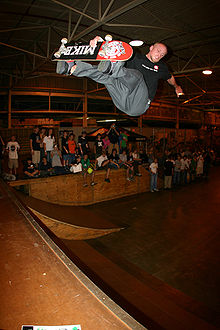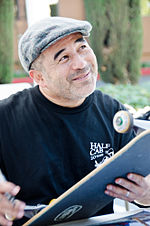Skateboarding sponsorship
[1] Sponsors employ a variety of methods in an effort to "discover" potential sponsorship recipients including word of mouth, the solicitation of "sponsor-me" videos[2] and direct participation in public skateboarding events and competitions, as well as raising awareness through social media websites.
[4] Obligations under the terms of a shop sponsorship vary but are usually light and the rider usually represents the sponsor by wearing branded apparel and by submitting media (videos and photographs) for use in advertising campaigns.
Amateur skateboard sponsorship involves the light provision of merchandise and equipment along with the occasional payment of travel and accommodation or living expenses when representing a sponsor in an out of town competition.
However, flow sponsorship usually involves the provision of free merchandise (no cost to the sponsored individual) but the offer is not traditionally consistent or long term.
Personal appearances are rarely part of any agreement and the aim of a flow sponsorship is to give the skateboarder a hand into the industry to help them on to a path involving a career.
Healthcare, image rights, bonuses, product design and art work licensing are commonly covered in professional skateboarding contracts.
Professional skateboarder Tony Hawk signed endorsement and sponsorship deals with a number of major brands worth up to US$15 million each, including deals with a number of non-skateboarding brands[6] most notably the Tony Hawk's series of video games published by Activision.

